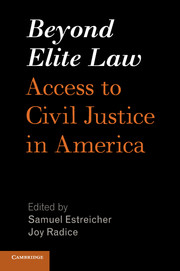Overview
Published online by Cambridge University Press: 05 May 2016
Summary
Thirty years ago, then-president of Harvard University Derek Bok delivered a stinging assessment of our justice system. He observed that our country, which prides itself on efficiency and fairness, “has developed a legal system that is the most expensive in the world, yet cannot manage to protect the rights of most of its citizens.” He famously observed that “[t]here is far too much law for those who can afford it and far too little for those who cannot.”
How have Americans fared in the thirty years since then?
For those who can afford it, we have a top-notch legal system. Highly qualified lawyers, who know the art of cross-examination and who compose scholarly briefs, help courts dispense justice fairly and efficiently. But that kind of representation comes at a price. More often, litigants lack wealth, insurance is absent, and public funding is not available. Some of our most essential rights – those involving our families, our homes, and our livelihoods – are the least protected.
Veterans languish an average of eight months before the government processes their claims for disability, pension, and educational benefits. Their poverty rate has increased. They face physical and mental trauma, and they comprise 20% of the homeless population. They experience significantly higher rates of unemployment than nonveterans.
The financial crisis has created ripple effects throughout society. Lower- and middle-income homeowners and tenants are grappling with legal issues as never before. Facing foreclosure or eviction, they can little afford representation to protect their rights. Over the past several years, high numbers of consumers and small businesses have sought bankruptcy protection.
American children are also at risk when interacting with the legal system. A family's lack of resources dramatically affects domestic matters, like custody and child support. Apart from that, families must grapple with issues involving juvenile justice. Texas has one of the largest school systems in the nation, with more than 4.4 million students. Children who misbehave in school are often issued tickets and may be charged with Class C misdemeanors. They must appear in court to contest the charges, but they have no right to counsel.
Cash-strapped families forgo representation, often with devastating consequences, such as arrest warrants and criminal records.
- Type
- Chapter
- Information
- Beyond Elite LawAccess to Civil Justice in America, pp. xxv - xxxPublisher: Cambridge University PressPrint publication year: 2016



